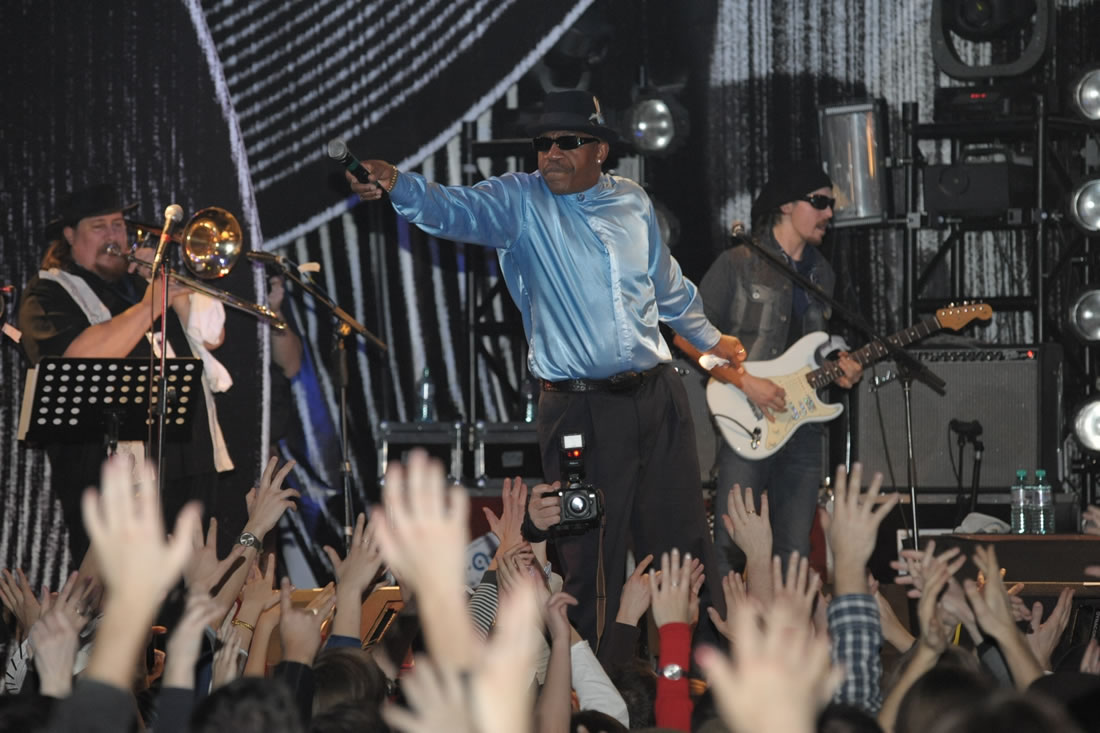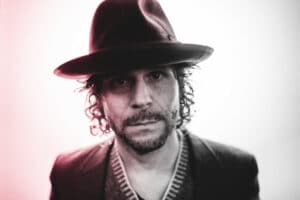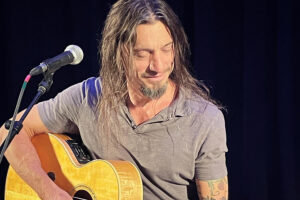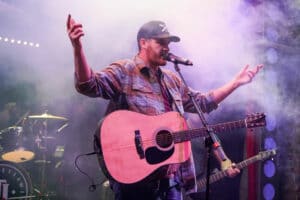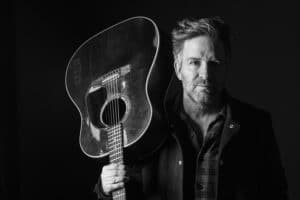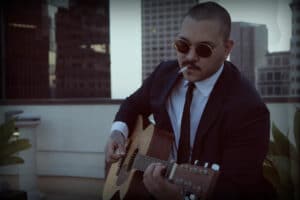FORTUNATE SON: The Rev. John Lee Hooker Jr. embraces his role as a proselytizing musical torchbearer
FORTUNATE SON: The Rev. John Lee Hooker Jr. embraces his role as a proselytizing musical torchbearer
September 2017, Spielberg, Austria: The Rolling Stones gathered to perform before roughly 100,000 people at the Red Bull Ring as part of the No Filter Tour, and their opening act — John Lee Hooker Jr. — asked for those assembled to pause for a moment.

“No one has ever asked to open up in a word of prayer in the dressing room of the Rolling Stones!” Hooker told The Ties That Bind Us recently. “Keith was standing there looking at me, just kind of staring, and after some thought, he said, ‘You know what, Jr.? I need prayer.’ So — glory to God, hallelujah — I sang ‘Amazing Grace’ to 120,000 people. I took the gospel of my Lord to a Rolling Stones concert in Austria, and it was surreal.”
There was a time when Hooker was resigned to the fact that he would spend the rest of his life behind bars due to his addiction and his lifestyle choices. Soledad, Jamestown, Vacaville, San Quentin, even a prison in a foreign country (Canada) — he’s done time in the all, but today, thanks to Jesus Christ, he’s a free man … and not just physically. He’s free from the bondage of addiction, which made him a prisoner long before he was ever put in handcuffs.
“You’ve gotta be able and willing to sell out — to give up every evil lifestyle, to sell out to God,” he said. “In other words, you’ve got to let all of that stuff go and say, ‘Lord, take over the reins of my life.’ And I’m telling you, you will not ever, ever be the same.”
Born under a bad sign

John Lee Hooker Jr. (left) with his father.
He comes by his musical pedigree honestly. His grandfather, Will Moore, was a famous entertainer during his day, and his dad also fathered two siblings, Zakiya and Robert, also musicians. (Robert, a minister, has since passed away. His cousin Archie Lee, who was raised as a foster brother, also performs and tours. At the age of 8, Jr. was performing on WJBK radio in Detroit, where he was born, and by 16, he was playing with his father's friends at a talent show at Detroit's Fox Theatre.
That was a few years after music grabbed hold of his soul, at The Apex Bar in Detroit. His father was performing that night and instructed his son to stay in the dressing room, but he heard the choogling boogie of the guitar and the roar of the crowd, and when he snuck out to see the commotion, he was greeted with a mesmerizing sight: His dad, on stage with Big Momma Thornton and Jimmy Reed, the crowd crushed against the front of the stage, screaming and dancing and laughing.
From then on, he knew what he wanted to do. Addiction, however, had other plans.
“Addiction comes from several avenues, if you will,” he said. “It can come from your environment — you want to be like the other guys. It can come from depression, from a non-structured home. It can come from a broken home and a broken family. I can’t pinpoint it in me; all I can say is that it was all of the above. I started hanging out, I had no structure, and experiments began to happen.
“You don’t learn, in a broken home, what not to do. You were already born bad, and after you were born bad, you’ve got to be taught to do good. I wasn’t really taught to do good or do the right thing — not that they didn’t mention it, but it wasn’t an everyday thing.”
By 13 or 14, he said, he was sniffing airplane glue out of a bag. Huffing led to pills, which led to cough syrup, which gradually transitioned to harder drugs — cocaine, heroin — which led to a habit that required maintenance beyond the conventional.
“That led to a life of destruction — stealing and robbing and conning and doing everything it takes to feed your habit,” he said.
From the prison stage to the cell block
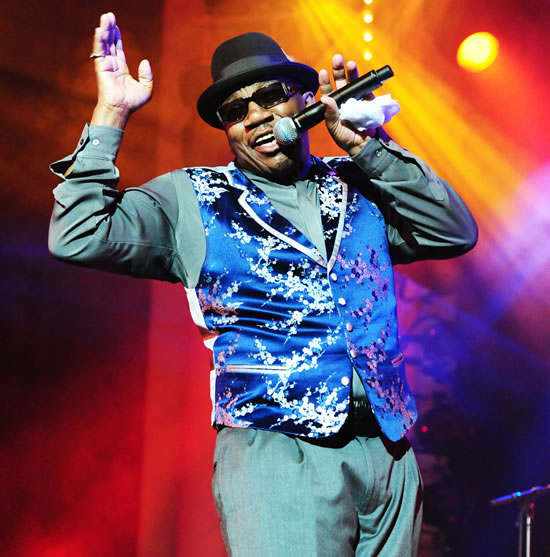
Little did the prisoners know that the headliner’s son was an ex-convict himself: He’d been released a couple of months earlier from a prison in Michigan, and his relationship with his parents was tenuous, at best. On top of that, Soledad, where the pair played, would become Jr.’s residence a decade later.
“Mama and Poppa, in their frustration, one day said, ‘We didn’t use drugs; why do you use drugs?’” Jr. said. “Which showed me as I grew up that they didn’t really understand addiction and that it’s not necessarily hereditary. It can be learned from the streets, from a party, from somone else’s behavior.
“It was a broken relationship with all of us. There was always the love from a mother and father, and there was some sympathy there, but empathy? The desire to help that comes from an understanding of what you’re going through? They didn’t have that.”
Left to his own devices, Hooker was in and out of jail over the next two decades. In 1985, he returned to Soledad — as an inmate. He was there for two years, and he went back in 1991 for another two-year stretch, but by that time, he had found Jesus. He’d been ordained in 1990 by the Church of God in Christ in Oakland before falling off the wagon, he said.
“I’ve been to so many drug programs and rehabilitation centers that I can’t even name them all,” he said. “I’ve overdosed so many times. I’ve been shot in two different states, I’ve been stabbed in my back, cut in my face, I’ve been homeless, I’ve been in and out of prison for most of my life. And one day a little chaplain lady came in and gave a little simple sermon — nothing sensational, just informational.
“I was on my way back to Soledad, and she said, ‘If you’ve tried everything, and if you’re tired of being tired, then try Jesus.’ And that’s what I did. I began to, with my own eyes, see a transformation from the desires to do evil. I even told my gang member friends that something had changed, and they said, ‘Yeah, right,’ but I got out, and I stayed with the Lord for five years.”
One step forward, two steps back
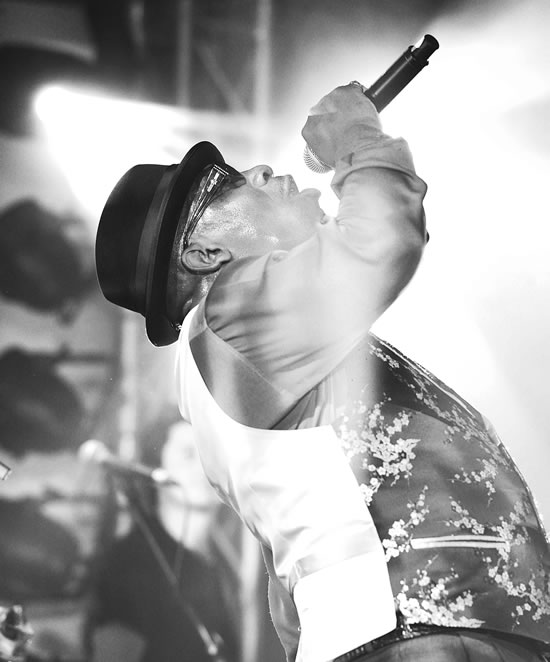
But every time he seemed to take two steps forward, addiction pulled him back. He spent time off and on in 10 different prisons, including a 90-day stretch at the former Oakalla Prison Farm in British Columbia, Canada, after getting high and running into parked cars after a Vancouver show. Eventually, he said, God got his attention.
“Something happened, and there was a lot of violence, and God said, ‘I didn’t call you to do this. Come back,’” he said.
He began pursuing his Clinical Pastoral Education at major general hospitals, and he received something of a divine message, he added: to change his lyrics of his music.
“I don’t sing about me and my baby or what we did last night or oh baby, how I miss you,” he said. “I sing about the Gospel. I sing about Jesus.”
And he does so with a big band behind him that combines elements of soul, R&B, funk and gospel into his trademark blues-and-boogie stew. He released “All Hooked Up” in 2012, and he’s currently at work on a new record he’s planning to call “Testify,” featuring Grammy Award winner and harmonica legend Charlie Musselwhite, as well as Eddie Minninfield of the Sheila E. band.
“Charlie and Eddie are collaborating with me; they both are on one of my songs called ‘Listen to The Spirit,’” he said. “I’ve still got my funky sound, but I’m singing about and testifying about Jesus Christ. I sing ‘Amazing Grace’ in a soulful style with a choir behind me. I’ve got a song called ‘My God Is Holy’ with violins and a big choir behind me.
“Eddie (a sax player who’s wailed alongside Prince and Beyonce) is on there; Juan Escovedo (famous percussionist), Bill Ortiz of Santana. Van Morrison said he would love to do it, but ‘Amazing Grace’ wouldn’t fit him, so we sent him another song, and we’re waiting to see if he’ll do that. If not, we’ll move on.”
The power of Godly transformation
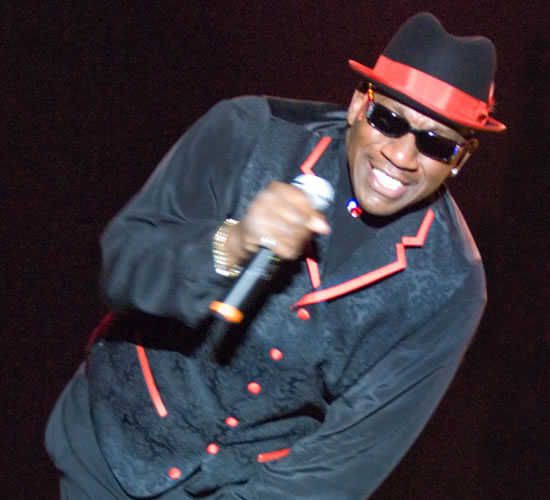
“I tell people about my transformation and how I was delivered by the power of God, and that I believe in the Lord Jesus Christ,” he said.
The flesh is weak, he points out — but if the spirit of a man (or woman) is willing, miracles can take place. When he speaks with such conviction, it’s authentic. It’s genuine. It’s the real deal, because there was once a time when the name John Lee Hooker Jr. was headed for a prison yard tombstone and the tragic tales of a life and talented wasted.
“The Bible says that even Jesus, when He was on His way to the cross, didn’t want to go and experience all of that pain and shame. But He said, ‘Nevertheless not my will, but thy will be done,’” he said. “And that’s what you’ve got to do: Let go of your will. The flesh, the humanity and the devil don’t want you to let go of that good feeling, that gratifying feeling of drugs, because you’re so used to it. The will of man doesn’t want to change.
“The way I see it, we serve a master — and that master is either the devil or the Spirit of God. All my life, I served the devil and did exactly what my desires wanted, and what they wanted was dope. But I brought my will to the Lord — not so much gave it to Him, because I still have my free choice, and I can do anything I want. I can pull off this freeway right now and go get me some dope. But I’m not a slave to what I used to be a slave to.
“That’s my life, my testimony, and that’s what I do,” he added. “I am the model, the testimony, that God the Holy Ghost can do anything.”
Check Out These Other Artists' Stories

